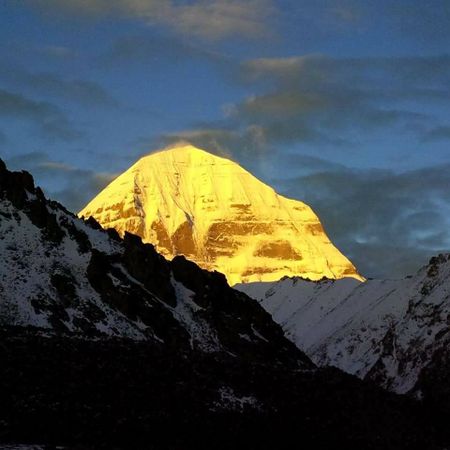Mount Kailash: Difference between revisions
Jump to navigation
Jump to search
No edit summary |
Yeshedorje (talk | contribs) mNo edit summary |
||
| Line 1: | Line 1: | ||
[[Image: Mount Kailash.jpg |thumb|450px| Mount Kailash with the rising sun]] | [[Image: Mount Kailash.jpg |thumb|450px| Mount Kailash with the rising sun]] | ||
'''Mount Kailash''' aka '''Gang Rinpoche''' is the most famous sacred mountain in Asian history, situated at an elevation of 6,656 meters above the sea level. | '''Mount Kailash''' aka '''Gang Rinpoche''' (Tib. གངས་རིན་པོ་ཆེ) is the most famous sacred mountain in Asian history, situated at an elevation of 6,656 meters above the sea level. | ||
With four distinct sides, the gigantic pyramid has a round cap covered in eternal snow and ice. Standing far above surrounding mountains, Mount Kailash gives life to 4 grand rivers: | With four distinct sides, the gigantic pyramid has a round cap covered in eternal snow and ice. Standing far above surrounding mountains, Mount Kailash gives life to 4 grand rivers: | ||
*'''Shiquan''' river, meaning Lion Fountain, known as '''Indus''' river in the lower reaches | *'''Shiquan''' river, meaning Lion Fountain, known as '''Indus''' river in the lower reaches | ||
Latest revision as of 15:12, 14 July 2022

Mount Kailash aka Gang Rinpoche (Tib. གངས་རིན་པོ་ཆེ) is the most famous sacred mountain in Asian history, situated at an elevation of 6,656 meters above the sea level. With four distinct sides, the gigantic pyramid has a round cap covered in eternal snow and ice. Standing far above surrounding mountains, Mount Kailash gives life to 4 grand rivers:
- Shiquan river, meaning Lion Fountain, known as Indus river in the lower reaches
- Maquan river, meaning Horse Fountain, the origin of Yarlung Tsangpo river
- Xiangquan river, meaning Elephant Fountain, known as Sutlej in the lower reaches (a major tributary of the Indus river)
- Kongqu river, meaning Peacock Fountain, the origin of the Ganges river